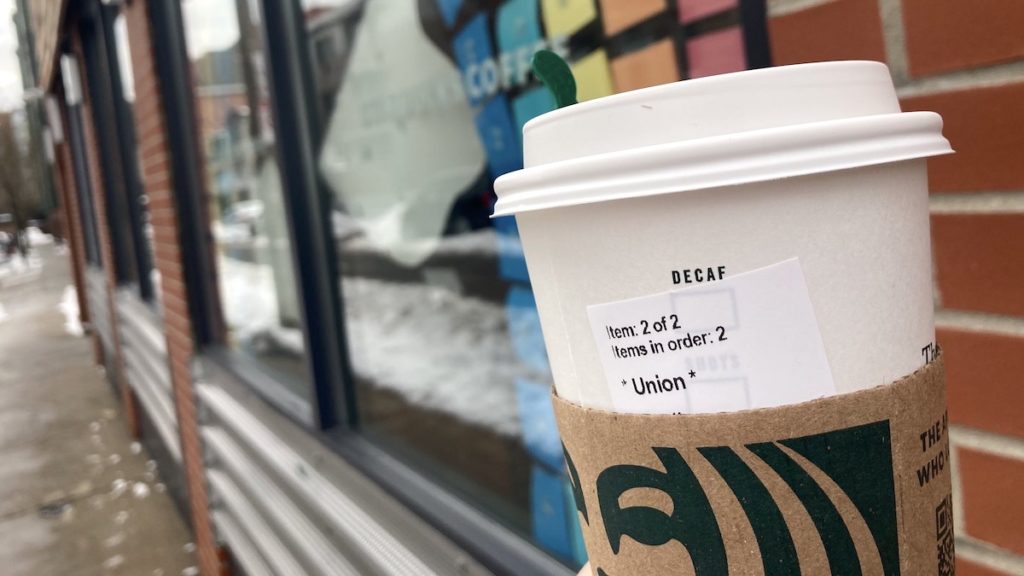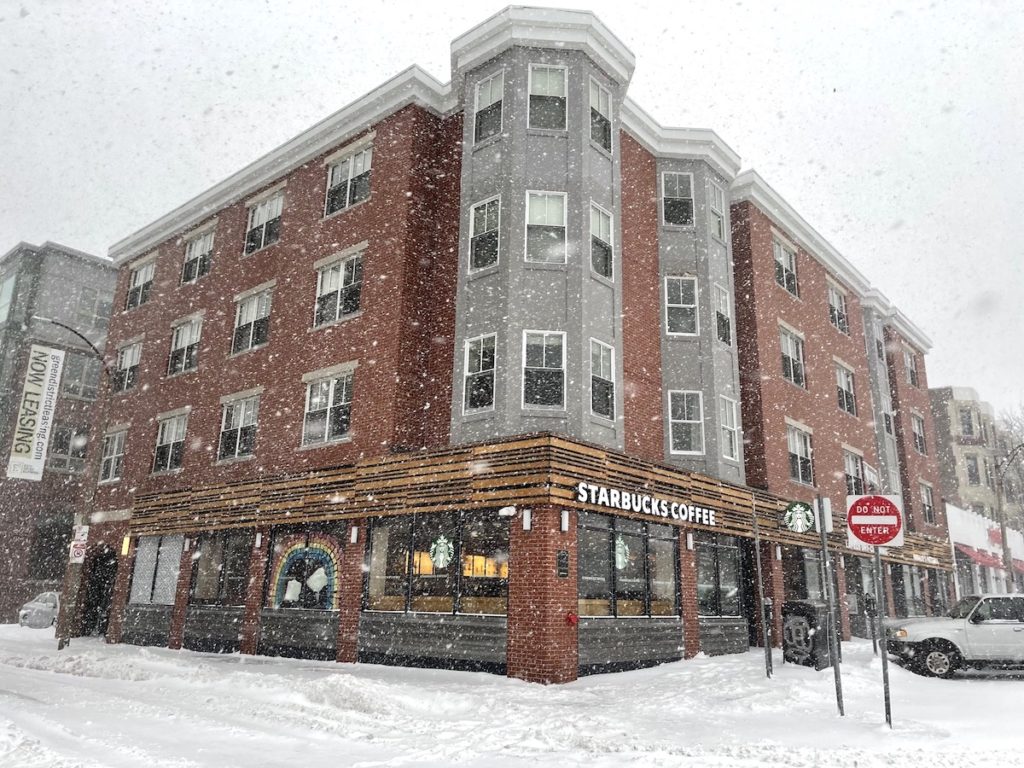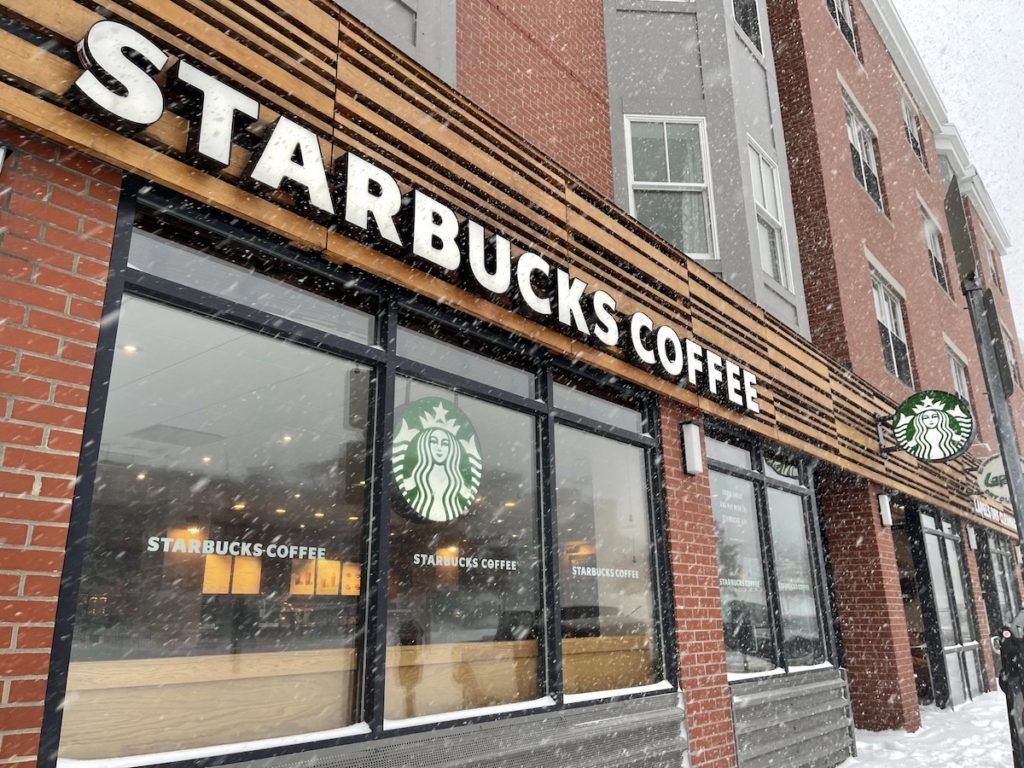Starbucks workers filed for union elections on Feb. 15 at three more locations in Massachusetts: Summer Street in Boston, Austin Street in Newton, and Kendall Square in Cambridge. A total of nine Starbucks stores in the Boston area have now filed for elections, the most stores filed in any Starbucks district.
Since the landmark victory in Buffalo, N.Y., where workers voted to form a union in early December, more than 93 stores have filed for elections in at least 23 states despite a union busting campaign by the company.
Working at Starbucks
In 2021, Starbucks netted $29 billion in revenue. CEO Kevin Johnson personally made $21 million. Yet, workers’ wages start at minimum wage, $14.25 per hour in Massachusetts — well below the living wage rate needed to survive in the state, which is closer to $37 per hour for a single parent with one child.
Although Starbucks touts its benefits programs, the pandemic has highlighted physical and mental health needs that are not comprehensively covered by the insurance plans offered to employees. Following the CDC’s revised guidelines, workers testing positive for COVID get only five days off.

Brendan Bennett, a worker at the 1304 Commonwealth Avenue location in Boston told Liberation News: “I got [COVID]. … I happened to get very sick. I was vaccinated and boosted, and still got very very sick. … It was this huge anxiety, if I’m not able to return right now in five days, I won’t be paid for the shifts I’m missing even though we’re in the middle of a pandemic.”
Hurdles in service industry union organizing
Over 12 million people work in the food service industry in the United States, with an additional 32 million working in retail, but fewer than 5% percent of those jobs are unionized.
One major hurdle to organizing in large chain stores like Starbucks is the bosses’ strategy of forcing district-wide votes for unions, as opposed to votes in individual stores. At companies like Starbucks, with hundreds of workers at dozens of stores in each city, this limits workers’ ability to organize campaigns and coordinate union votes.
But a change could open the floodgates of worker organizing throughout the United States. The Buffalo location, which unionized in December, successfully lobbied the National Labor Relations Board to allow store-by-store units and votes, setting a precedent for the state.
Starbucks’ anti-union response
Since Buffalo, Starbucks corporate has hired notorious anti-union firm Littler-Mendelson and engaged in a nationwide union-busting campaign. Kylah Clay, a core organizer in the union drive in Boston highlighted “listening sessions,” one union-busting strategy, where workers are forced to have long meetings with corporate representatives who speak on anti-union talking points.

Clay told Liberation News, “We had the VP of the region come by. … We had never seen her before. And all of a sudden she’s in our store telling us why unions are bad. … They’ll tell you lies about how unions really work.” Regarding COVID safety at these meetings, she said, “It’s really not smart, health wise. We’re getting everybody together, including three corporate people. Some of them do a lot of traveling.”
Starbucks Workers United created a petition calling for Starbucks to end its interference. The petition specifically addresses this tactic of sending anti-union managers to surveil and intimidate workers at stores with union campaigns, stating:
“If Starbucks holds a meeting with partners on company time to discuss unionization, then the union may hold a meeting of equal length on company time. This holds true for one-on-one meetings or any discussions that Starbucks chooses to hold with partners during the union organizing effort.”
The petition also denounces retaliation against pro-union workers, such as the recent firing of worker organizers in Memphis, Tennessee.
The fight ahead
Boston-area Starbucks workers are waiting to find out whether they will be forced to have a district vote or will be able to have store votes. Because of the victory in Buffalo and a follow up ruling in Mesa, Ariz., against district votes, the workers Liberation News spoke with are optimistic that a district vote is unlikely.

“We’ve also jokingly been saying, well, it looks like they’re going to get that district-wide vote because we’re getting more and more stores in our district [to file for a union].” said Clay. “We’re not intimidated.”
The Starbucks union is a significant leap forward for service industry unions. Prior to the Buffalo victory, several other smaller coffee shops had been able to win unions, such as Darwin’s, Pavement, and Spot Coffee.
“We understood that our labor makes Starbucks net revenue, and we’re getting paid minimum wage,” Bennet said. “It’s just about having a say in the corporation we’re so integral to … we felt like it was a time for a change and time for us to reclaim some of the power we rightfully deserve.”





